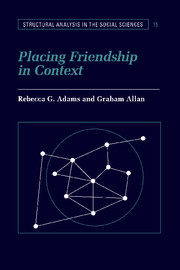Book contents
- Frontmatter
- Contents
- Notes on the contributors
- Acknowledgements
- 1 Contextualising friendship
- 2 The modernisation of friendship: individualism, intimacy, and gender in the nineteenth century
- 3 The gendered contexts of inclusive intimacy: the Hawthorne women at work and home
- 4 Friendship and the private sphere
- 5 Rich friendships, affluent friends: middle-class practices of friendship
- 6 Women's friendships in a post-modern world
- 7 Foci of activity as changing contexts for friendship
- 8 The demise of territorial determinism: online friendships
- 9 Reflections on context
- Index
- Structural Analysis in the Social Sciences
1 - Contextualising friendship
Published online by Cambridge University Press: 15 December 2009
- Frontmatter
- Contents
- Notes on the contributors
- Acknowledgements
- 1 Contextualising friendship
- 2 The modernisation of friendship: individualism, intimacy, and gender in the nineteenth century
- 3 The gendered contexts of inclusive intimacy: the Hawthorne women at work and home
- 4 Friendship and the private sphere
- 5 Rich friendships, affluent friends: middle-class practices of friendship
- 6 Women's friendships in a post-modern world
- 7 Foci of activity as changing contexts for friendship
- 8 The demise of territorial determinism: online friendships
- 9 Reflections on context
- Index
- Structural Analysis in the Social Sciences
Summary
It is clear that friendships play a significant part in many people's lives. Yet sociologists in general have paid these and other similar relationships relatively little attention in their efforts to understand the nature of social organisation. Even when their concern is explicitly with aspects of social integration, little heed is normally given to the specific realm of friendship. There are of course exceptions to this, as the work referenced in this volume attests, but generally sociologists have been content to leave the study of friendship to social psychologists. Most sociologists appear to take the view that, with modernity, and late modernity in particular, friendship and other linked informal ties are of small consequence socially and economically. The dominance of formal organisations is taken as synonymous with a decline in the importance of informal ties, though, as Silver (1990) has shown, the evidence for such a view is anything but convincing. Yet, with informal solidarities defined as being of only personal significance, analysis of them has largely been ceded to psychologists.
This is a challenge which social and other psychologists have taken on very actively. Over the past fifteen years, there have been major changes in the ways in which researchers analyse and understand friendships and other personal ties (Duck, 1990; Duck, Dindia, et al., 1997). The starting point of this approach was a rejection of the dominant ‘attributes’ perspective within psychology, particularly for its disciplinary insularity and its focus on the properties of individuals within relationships rather than on the relationships themselves.
- Type
- Chapter
- Information
- Placing Friendship in Context , pp. 1 - 17Publisher: Cambridge University PressPrint publication year: 1999
- 8
- Cited by

